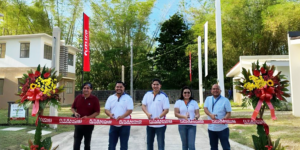
Checkpoints are up again all over the place, especially in Bacolod City that has been forced to reinstate the Home Quarantine Pass solution once more in a desperate bid to do something about the surge of coronavirus disease 2019 cases.
COVID-19 cases dramatically increased after the border controls that came with the enhanced community quarantine were loosened and the national government task force responsible for keeping the outbreaks under control inexplicably unleashed the hounds of COVID-19 upon our ill-prepared communities.
Cases have been rising ever since the locally stranded individuals were sent home sans the proper quarantine and testing protocols that could’ve ensured the sanctity of the quarantines that had thus far protected our towns, cities and economies. The decision of the higher officials to leave us all to fend for ourselves wasted the lockdown months of April to June when our COVID-19 cases were essentially minimal and the situation in the provinces at least felt under control.
Based on the surge of COVID-19 infections that started after the ECQ, whatever bare minimum protocols and protections that were supposedly put in place by the people in charge, both from the national and local government side, were obviously not enough as the LSIs and OFWs were sent home. We all knew they had to be sent home sooner or later, but the people who should’ve done something to protect our population from the outbreak obviously didn’t do enough so here we are.
Local government officials tried a mass testing approach a couple of weeks ago but apparently that wasn’t enough because another round of HQP restrictions have been deemed necessary once more. In a world where adding inconvenience is regarded as a sign of doing something, maximum inconveniences have to be imposed every now and then so everyone can see and feel how serious the people in charge are as far as COVID is concerned. The return of the HQP should convince everybody that something is being done.
I cannot argue against the decision to reinstate HQP because controlling the movement of people is one of the simplest yet most effective strategies against the spread of COVID-19. Even if there is evidence to prove that Filipinos were not as “pasaway” as our national government propagandists and excuse-makers insist, the fact remains that the downgraded quarantine status resulted in greater access and mobility for all. Our government officials have tried encouraging people to stay home but it has become painfully obvious that more need to stay home and less need to go out if we are to slow down the surge. Hence the return of the comeback HQP.
What gets my goat, as usual, is the implementation.
HQPs are now required but why do the checkpoints that are set up have to ensure maximum inconvenience? Why block the roads to check every company ID, certificate of employment, or HQP; resulting in massive traffic, crowding and inconvenience?
Do the implementers not know that studies have shown that public transportation in open air, socially distanced vehicles such as our jeepneys is relatively safe, and another factor that makes public transportation safe is reducing contact time of passengers? The massively inefficient checkpoints manned by men in long arms and camouflage uniforms have increased commute, standby and potential contact times, increasing the risk of infection among commuters who now spend those extra minutes crowded like cattle and stuck in queues. Isn’t that counterproductive?
The military style checkpoint should be a last resort instead of a first resort. Business establishments can impose restrictions by not allowing entry for non-HQP or company ID bearing people anyway, and if there are people massing in public areas (ala checkpoints), then the police riot control squads, can be summoned to swoop in and start demanding to see credentials. But as long as compliance is apparent in the situation on the ground, checkpoints shouldn’t be absolutely necessary when there are ways to do this without inconveniencing and potentially exposing thousands to the same threat they are supposed to be protected from.
Decentralized checkpoints can be set up at the barangay level, manned by barangay personnel. No HQP, No ID, no exit. For banks, malls, and other business establishments, the same can be implemented, with entry being restricted instead of exit. The key entry points into the city does not have to be choked up.
Police resources can be better used on roving patrols where they help implement social distancing and face mask wearing protocols. If they see too many people in one place, they can step in and ask for passes or IDs, becoming part of the solution instead of being part of the problem when their weapon of choice chokes up traffic, generates avoidable crowding, and increases potential contact time among commuters and motorists. I don’t know the numbers but it would be fair to estimate 95 percent of those passing through the current checkpoints probably come with complete documents: HQP, company ID, or certificates of employment, marriage, medical condition or what not. Inconveniencing 95 percent of the population to catch or discourage 5 percent seems like a colossal waste of time and resources for everyone involved.
It is almost half a year since the outbreak and lockdowns started. The leaders of the Metro Bacolod area should’ve come up with a more elegant solution by now, considering that the people of Bacolod, Talisay, Silay and Bago treat the places they live and work in as one homogenous area.
It is tempting to come up with solutions that make life miserable for as many people as possible so they feel the “work” involved. The trouble with providing seamless solutions that achieve the same goals without inconveniencing everyone is that when nobody is inconvenienced, they end up thinking nothing was done and ultimately, still complain. That is why checkpoints are the go-to moves: they are visible, it creates maximum hype, and people cannot really complain too much because the inconvenience supposedly serves a higher purpose. The mantra becomes: “At least our leaders are doing something.”
Are check points the best solution to the problem? I would beg to disagree but I’m just a pundit. We probably need HQPs, mass testing, and to limit non-essential movement but I’m not sure if check points are part of the solution or part of the problem. But I would like to talk about it so we can be enlightened on why our leaders seem to think that particular pivot is a sure-fire move when it comes to fighting the spread of an invisible virus.*







